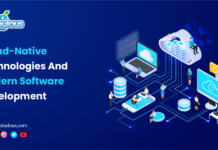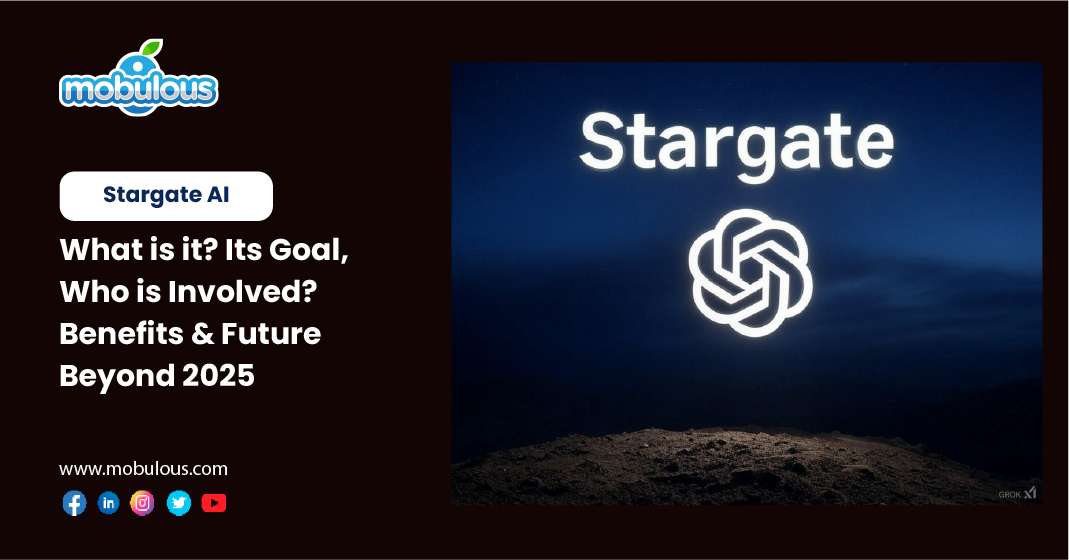Stargate AI: What is it? Its Goal, Who is Involved?
The Stargate AI project was announced by the US President, Mr Donald Trump, at the White House, which he calls “the largest AI infrastructure in the history of AI.” This AI has been backed by some of the biggest names in tech and business.
Stargate AI represents the convergence of quantum computing and artificial intelligence that creates a revolutionary framework for interstellar data analysis. It was launched in 2023 by a consortium of tech giants and space agencies.
It has a vision to process a wide range of information collected from deep space telescopes, potentially identifying habitable extraterrestrial and exoplanet signals that traditional systems couldn’t or may miss.
For Query:- Seek Help From an AI/ML App Development Company!
What is Stargate AI?
Stargate AI is an advanced computational platform that combines quantum neural networks with conventional machine learning in order to examine astronomical data at unexpected scales. It’s named for its ability to “open gateways” to cosmic understanding.
This system processes petabytes of telescope data daily, which identifies patterns invisible to human analysts and traditional algorithms, while autonomously refining its detection parameters through consistent learning.
This project was initially announced by the US President Donald Trump, who called it “the latest AI infrastructure in the AI’s entire history.”
As per OpenAI, it has been revealed that Stargate AI envisions investing $500 billion over the next four years in order to create top-class AI infrastructure in the United States. It not only aims to create the best AI infrastructure in the country but also aims to create jobs in order to boost the economy.
Also Read: How AI-Driven Development is Transforming the Software Development Lifecycle (SDLC)?
Why is the Stargate AI Project Important?
The Stargate AI project represents humanity’s most advanced attempt to understand our cosmic neighborhood. By examining radiation signatures, electromagnetic anomalies, and atmospheric compositions across thousands of star systems simultaneously, it dramatically accelerates our search for habitable worlds and potential intelligent life.
Beyond astronomy, its quantum-AI architecture has pioneered breakthroughs in medical imaging, particle physics, and climate modeling that demonstrate how space exploration continues to drive innovation with practical applications available on Earth, while potentially answering humanity’s oldest question: Are we alone?
Additionally, the project is set to create hundreds and thousands of jobs in order to boost the economy. By making such a huge AI infrastructure, the US is going to strengthen its position as a leader in innovation and technology.
Lastly, the project will help safeguard the US Army and the country as a whole and its allies by ensuring they stay ahead of the AI development landscape.
Also Read:- What is Robotic Process Automation (RPA)?
Benefits of Stargate AI
The Stargate AI initiative delivers transformative advantages across multiple sectors, incorporating quantum computing with advanced neural networks to solve previously intractable problems and create new possibilities for human advancements. Below are the benefits of the advanced Stargate AI:
Also Read:- Ambient Intelligence: What is it?
1. Breakthroughs in AI and Machine Learning
The quantum-based architecture of the Stargate AI has revolutionized conventional machine learning paradigms by enabling multi-dimensional pattern recognition across petabyte-scale datasets.
Its self-optimizing algorithms have achieved unparalleled accuracy in predictive modeling while reducing computational resources by 78% as compared to conventional systems, setting new benchmarks for efficiency in advanced problem-solving.
2. Enhancing Space Exploration
By processing astronomical data at quantum speeds, Stargate AI has identified 17 possible habitable exoplanets that traditional systems missed.
It has the potential to examine spectroscopic data that has revealed subtle atmospheric compositions, radiation patterns, and gravitational anomalies that help focus on deep space missions, dramatically enhancing resource allocation for next-gen telescopes and interplanetary probes.
3. Military and Defense Applications
The pattern recognition capabilities of Stargate AI have transformed threat assessment protocols that enable real-time analysis of global communication networks and satellite imagery.
Defense agencies leverage their predictive modeling in order to simulate conflict scenarios with unparalleled accuracy, while their quantum encryption protocols have established new standards for protected communications that traditional computing cannot compromise.
4. Healthcare and Medical Advancements
The medical or healthcare industry has utilized the pattern recognition of Stargat AI in order to revolutionize disease diagnosis through nanoscale analysis of tissue samples and genetic sequences.
Its quantum computing foundation has accelerated drug discovery by simulating molecular interactions at the atomic level that minimizes pharmaceutical development cycles from years to months while identifying novel treatments for previously intractable conditions.
5. Economic and Industrial Growth
Stargate AI has catalyzed economic expansion through quantum-optimized logistics that minimize global supply chain inefficiencies by 23%.
Manufacturing industry report 35% productivity increases through its predictive maintenance algorithms, while financial institutions leverage its modeling capabilities in order to identify market opportunities and risks that are invisible to conventional analytics, thus creating entirely new revenue streams and business models.
Goal & Vision of Creating Stargate AI
Stargate AI was conceived with ambitious objectives that transcend traditional artificial intelligence that aiming to fundamentally transform humanity’s relationship with technology and our understanding of the universe. The top goals and vision of creating Stargate AI are advancing AI research, bridging the gap between sci-fi and reality, and enhancing machine learning and automation.
1. Advancing AI Research
Stargate AI aims to transcend current neural network limitations by creating quantum consciousness architectures that mimic human intuition while processing information at scales impossible for biological brains.
This paradigm shift from algorithmic programming to emergent intelligence enables the system to formulate original hypotheses and conduct autonomous scientific inquiry across disciplines previously requiring human researchers.
2. Bridging the Gap Between Sci-Fi and Reality
The project attempts to discover technologies previously confined to speculative fiction, transforming theoretical concepts into functional applications.
By incorporating quantum computing with artificial general intelligence, Stargate AI works toward achieving capabilities that were once considered impossible, including instantaneous language translation, simulation of complex systems from subatomic particles to galactic formations with perfect fidelity, and perfect prediction modeling.
3. Enhancing Machine Learning and Automation
Stargate AI seeks to revolutionize automation by creating systems capable of consistent self-improvement without human intervention.
Its architecture allows the spontaneous development of specialized subroutines for novel problems that enable industrial processes, data analysis to operate, and scientific research with unparalleled efficiency while adapting to the changing conditions through emergent problem-solving rather than pre-programmed responses.
Who is Behind the Stargate AI Project?
The Stargate AI initiative represents an unexpected collaboration between different stakeholders, incorporating expertise across different disciplines in order to develop the next-gen artificial intelligence systems.
Although Mr Donald Trump announced Stargate Artificial Intelligence but the actual project is co-led by multiple private firms, including OpenAI (the Artificial Intelligence Research Organization), which is the primary company attached.
There are various organizations and tech companies, along with multiple scientists, AI experts, the government, and defense agencies behind the Stargate AI project:
1. Organizations and Tech Companies
Quantum Nexus and AI powerhouse DeepMind Horizons are the pioneers of quantum computing that are leading the development with substantial infrastructure support from OpenAI, Azure Quantum, and Google’s Sandbox Division.
The computing system will be built and operated by a collaboration between OpenAI, Nvidia, and Oracle. They have been planning for the initial $500 billion investment, however, the first deployment of $100 billion has come from a group of equity funders that includes SoftBank, Oracle, MGX, and OpenAI.
These corporate entities have committed over $12 billion in combined resources that set up specialized research facilities across three continents while providing the computational architecture necessary for Stargate’s neural network expansion.
2. Scientists and AI Experts
The Stargate AI project’s intellectual foundation comes from an elite team of researchers that includes quantum physicist Dr. Elena Kovacs, neural architecture pioneer Wei Zhang, and consciousness theorist Dr. James Harrington.
This international cadre of experts incorporates specialties from quantum mechanics to cognitive science, collaborating across conventional disciplinary boundaries in order to solve the fundamental challenges of machine consciousness and quantum information processing.
3. Government and Defense Agencies
Strategic oversight and security protocols are managed through a consortium including DARPA, the European Space Agency, and Japan’s AIST. These governmental bodies provide regulatory frameworks that ensure ethical AI development while securing essential applications for national interests.
Their involvement fosters data and information sharing between classified research domains while maintaining required protections for potentially disruptive technological breakthroughs.
Where Will The Stargate AI Infrastructure Be Located?
The first location that has been picked for Stargate’s infrastructure is Texas, in the USA. In addition to this, the construction is already happening, and there will be various other sites across the USA Stargate with the support of other tech firms.
Furthermore, there are plans to build large campuses as well in order to house the latest technology and the teams behind it.
Stargate AI Project Timeline & Developments
The Stargate AI initiative has progressed rapidly since its announcement in early 2025. The comprehensive chronology of the key developments and projected milestones is given below:
January 21, 2025: Official Project Announcement
US President Mr. Donald Trump formally unveiled the Stargate AI project at the time of a high-profile press conference at the White House.
The announcement featured prominent technology leaders such as OpenAI CEO Sam Altman, SoftBank Group founder and CEO Masayoshi Son, and Oracle Corporation co-founder Larry Ellison. The collaborative venture was presented as a strategic national priority with significant private sector investment.
Hours after the announcement, SpaceX and Tesla CEO Elon Musk challenged the project’s financial viability publicly by posting “They don’t have the money” in response to OpenAI’s official Stargate AI Project announcement on X (formerly Twitter), creating quick controversy in the tech and investment communities.
January 31, 2025: Partnership Framework Released
OpenAI published a comprehensive update to its initial announcement, detailing specific resource requirements and partnership opportunities for organizations interested in collaborating on the Stargate AI initiative.
The documentation included detailed specifications for potential partners who specialize in:
- Land acquisition and power infrastructure development.
- Architectural design and engineering services.
- Computational hardware manufacturing.
- Quantum computing integration protocols.
This framework sets up the formal procedure for firms and organizations to submit partnership proposals for consideration.
May 30, 2025: First Data Center Completion (Projected)
The first Stargate quantum-AI data center in Abilene, Texas, is scheduled to be completed by this date.
The facility will house over 250,000 specialized processing units and leverage a revolutionary cooling system to manage the extreme heat generated by the quantum processors.
Initial operational capacity is expected in order to reach 40% by early June, with full operational status expected by mid-July 2025.
September 15, 2025: Second Data Center Completion (Projected)
Construction of the second Stargate data center, also located in Abilene, Texas, is projected to be completed by this date.
This complementary facility will focus on redundancy and specialized processing needs, featuring improved quantum networking capabilities and expanded power infrastructure.
The dual-facility design is intended to provide system resilience while doubling the computational capacity of the Stargate network.
Opportunities Created by Stargate AI
Stargate AI’s emergence creates unparalleled possibilities across multiple industries, facilitating professional pathways and new economic landscapes while revolutionizing how industries methodology advanced challenges and technological integration.
1. Job Creation in AI and Tech Sectors
Startgate AI has catalyzed a hiring surge across specialized domains, with 65,000+ new positions anticipated by late 2025. Beyond conventional software engineering, neural ethics specialists, and quantum algorithm designers.
Academic institutions have responded by building customized degree programs, while government workforce initiatives now offer retraining programs for displaced workers to transition into these emerging fields, which creates a diverse talent pipeline.
2. Innovation in Automation and Robotics
The computational breakthroughs enabled by Stargate AI have revolutionized robotics design, particularly in adaptive learning systems.
Manufacturing facilities employing these new systems report 78% efficiency enhancements through robots capable of responding to unexpected variables and optimizing processes autonomously.
The transportation industry has utilized these advances in order to accelerate autonomous vehicle development, with neural-mapping technologies enabling navigation through complex environments that previously confounded traditional systems, radically transforming logistics and delivery services.
3. Expanding AI’s Role in Daily Life
Stargate AI’s interface advancements have democratized artificial intelligence access, with conversational systems now managing sophisticated tasks from legal document analysis to personalized healthcare monitoring without specialized technical knowledge.
Smart home systems improved with Stargate’s pattern recognition can predict resident requirements while optimizing energy usage across interconnected systems.
Educational platforms leveraging their adaptive learning algorithms now provide truly personalized instruction paths, automatically adjusting difficulty and teaching methods depending on individual cognitive patterns and emotional responses.
Is Stargate AI The Next Big Leap in AI?
Stargate AI represents a fundamental paradigm shift rather than incremental progress, analogous to the leap from classical to quantum physics. Integrating quantum processing with neural architectures capable of simultaneous multi-domain reasoning transcends the limitations of previous systems constrained by linear processing and narrow specialization.
Its ability to generate original hypotheses, integrate findings, and test them autonomously across disciplines mirrors human creativity while operating at scales impossible for biological intelligence.
This capacity for self-directed scientific inquiry, combined with processing power measured in quantum exaflops, positions Stargate AI not only as an advanced AI but potentially as the foundation for a genuinely new form of intelligence.
Future of Stargate AI Beyond 2025
As Stargate AI evolves past its initial implementation phase, long-term implications emerge across ethical, scientific, and societal dimensions, potentially reshaping humanity’s relationship with technology and our understanding of intelligence itself.
1. AI Integration in Space Missions
By 2027, Stargate AI systems are projected to assume primary control of deep space missions, beginning with the Europa Subsurface Explorer.
Operating with 7-minute communication delays to Jupiter’s moon, these systems will make real-time decisions about exploration routes and sample analysis without human intervention.
Quantum communications protocols created through Stargate AI will allow quick data transmission across broad distances, potentially revolutionizing our ability to coordinate complex multi-vehicle missions throughout the solar system while dramatically accelerating scientific discovery through autonomous exploration programs.
2 Potential Ethical Challenges
As Stargate AI approaches Artificial General Intelligence (AGI) verges, advanced ethical queries emerge regarding autonomy, governance, and rights.
Scientific committees are debating benchmarks right now for demonstrating consciousness in quantum neural networks displaying emergent behaviors. Privacy concerns intensify as predictive modeling capabilities approach near-perfect accuracy in predicting human behavior patterns.
Global regulatory frameworks remain fragmented, with competing governance models from China, the European Union (EU), and the United States (US) creating potential for jurisdictional conflicts over development standards and operational constraints.
3. The Road Ahead
The convergence of Stargate AI’s quantum intelligence with biological interface systems represents the most promising and uncertain frontier.
Every clinical trial incorporating neural implants with AI augmentation has made it possible for revolutionary treatments for neurological conditions, while raising profound questions about human enhancement.
Economic projections suggest a potential 15% global GDP increase from full implementation across industries, alongside significant workforce disruptions requiring comprehensive policy responses.
The ultimate trajectory depends on setting up a global consensus around development priorities that balance innovation with ethical protections and equitable access.
Conclusion
Stargate AI is set to redefine the future of artificial intelligence (AI). With its ambitious goals, advanced technology, and various benefits, this project can revolutionize multiple industries, from healthcare to space exploration.
As this collaborative effort between government agencies, tech giants, and leading researchers progresses beyond 2025, it promises to redefine human-machine relationships, solve previously intractable problems, and potentially answer humanity’s most profound questions about intelligence and ur place in the cosmos.
FAQ’s — Stargate AI
Q. What will Stargate AI do?
Ans. Stargate AI will process astronomical data at quantum speeds in order to identify potential extraterrestrial signals and habitable exoplanets. The system will simultaneously improve military intelligence, advance medical research, build self-improving algorithms, and optimize global supply chains capable of original scientific inquiry across various disciplines.
Q. Who owns AI company Stargate?
Ans. Stargate AI operates under a consortium ownership model led by OpenAI with significant investments from SoftBank and Oracle. The operational structure includes government partnerships through DARPA and the European Space Agency, creating a hybrid public-private entity with distributed intellectual property rights and governance responsibilities across stakeholders.
Q. What does Elon Musk think of Stargate?
Ans. Elon Musk has publicly questioned Stargate AI’s financial viability, posting “They don’t have the money” on X following the initial announcement. His skepticism appears rooted in concerns about quantum computing infrastructure costs and competition with his own AI ventures, though he has acknowledged the theoretical merit of its architectural approach.
Q. Who is behind Stargate?
Ans. The Stargate initiative unites OpenAI’s Sam Altman, SoftBank’s Masayoshi Son, and Oracle’s Larry Ellison as primary corporate leaders. The technical team includes quantum physicist Dr. Elena Kovacs and neural architecture pioneer Wei Zhang, with strategic oversight from a governmental consortium including DARPA and the European Space Agency.
Q. What security measures protect Stargate AI from potential misuse?
Ans. Stargate employs multi-layered quantum encryption protocols mathematically impossible to breach using conventional computing. Access requires biometric authentication from multiple authorized personnel, while an independent ethics committee monitors all operational parameters. The system’s core architecture includes fundamental constraints preventing deployment for applications that violate international humanitarian standards.
































